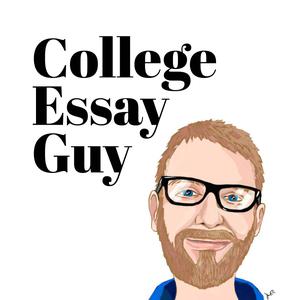
The College Essay Guy Podcast: A Practical Guide to College Admissions
Ethan Sawyer
- 51 minutes 50 seconds523: Busting College Admission Myths Using Data (Part 1 of 2): Standardized Tests, Rankings, and the Cost of College with Akil Bello
Welcome to our new series on busting college admission myths using data. In today’s episode, Ethan is joined by Akil Bello to talk about standardized tests, rankings, and the cost of college. They dig into some common misconceptions about college including:
- Are most colleges returning to requiring standardized testing scores?
- Is it too hard to get into college?
- Are highly-ranked colleges better?
- Is it true that most colleges now cost more than $100,000 per year to attend?
- And more!
Akil Bello is an educator, strategist, researcher, policy consultant, and advocate for equitable access to education. For more than 30 years, he’s worked every job you can imagine related to admission testing and college access from tutor, to test prep company founder to CEO and now works as the Senior Director of Advocacy at Fair Test. When he is not moonlighting reading college applications for a public university, he serves on several advisory boards, writes articles for Forbes, and helps his wife parent their college freshman and HS junior.
We hope you enjoy!
Play-by-Play:
- 1:56 - Akil shares a bit about his background and identities
- 3:57 - What is Fair Test and what does Akil do as Senior Director of Advocacy?
- 6:03 - Myth #1: Most colleges are returning to requiring standardized testing scores.
- 11:25 - Myth #2: Universities are returning to standardized tests because they help attract students of color?
- 13:40 - Myth #3: Standardized test scores are a reliable predictor of GPA in college.
- 16:18 - Myth #4: It is harder than ever to get into college.
- 19:25 - Myth #5: The higher the ranking, the better the school.
- 27:59 - What are some good questions that students can ask themselves when developing a college list?
- 29:52 - Myth #6: College is expensive.
- 33:59 - Myth #7: A particular essay, extracurricular, or passion project gets students into college.
- 37:34 - What are some good questions that students can ask themselves when considering whether or not to submit a test score?
- 43:26 - What are some good questions that students can ask themselves if they are considering writing about race in their college essay or application?
- 46:44 - Akil shares advice to parents and students who are navigating this process
- 51:28 - Wrap up and closing thoughts
Resources:
17 December 2024, 5:00 pm - 1 hour 14 minutes522: Storytelling & Identity with Ethan Sawyer (Part 4 Bonus Episode!): On Balancing Identities, Writing as a Journey, and the Mystery of Enoughness
In our most recent series on storytelling and identity, Ethan sat down with his screenwriter friends to do a deep dive into the creative process, the power of storytelling, and how identity plays a role in both. In this bonus episode, the tables are turned as Ethan is interviewed by CEG Essay Coach, Ali Pineo. In their conversation, Ethan and Ali get into:
- Ethan’s background and how his identity has evolved over the years
- The roles Ethan identifies with most: connector, harmonizer, and seeker
- How Ethan measures success in his personal and professional life
- His journey from aspiring screenwriter to teacher and writer
- Brainstorming Ethan’s own personal statement as if he were writing it today
- And more
Ali Pineo is a writing coach and college admissions essay specialist with a BA in English from Stanford University and MFA from UC Irvine. She is passionate about building her students’ confidence in the writing process and developing them into strong self-advocates for their individual learning needs. She has spent thousands of hours coaching admissions essay writing and tutoring AP English and US History,. and the highlights of her career center around her mentorship of bright students with learning differences. In addition to teaching, she is an arts entrepreneur, former professional ballet dancer, and mama to a busy toddler.
We hope you enjoy!
Play-by-Play:
- 1:41 - Introductions
- 2:48 - Ethan shares the roles he identifies with most
- 10:36 - What does Ethan’s identity of “Connector” mean to him?
- 14:34 - How does Ethan distinguish between the “Connector” and “Harmonizer” roles?
- 20:16 - Do any roles conflict with other identities?
- 25:13 - How does Ethan balance his many roles?
- 28:37 - How does Ethan measure success in his personal and professional life?
- 33:20 - In what ways have Ethan’s career aspirations changed over the years?
- 37:00 - How does Ethan define his role as a “Culture-Tender?”
- 43:55 - What has Ethan been writing about lately?
- 47:18 - Ali shares her a bit about her background, roles, and identities
- 52:33 - How do Ethan’s outward identities overlap with his inner world?
- 56:48 - Brainstorming Ethan’s own personal statement as if he were writing it today
- 1:11:37 - Closing thoughts and wrap-up
Resources:
3 December 2024, 5:00 pm - 1 hour 20 minutes521: Storytelling & Identity with Ryan Maldonado (Part 3 of 3): On Code-switching, Photographing Living Rooms, and Growing up Not-Rich in Miami
In this three-part series, Ethan sits down with his screenwriter friends to do a deep dive into the creative process, the power of storytelling, and how identity plays a role in both. In Episode 3, Ethan is joined by screenwriter Ryan Maldonado, known for his work on AMC’s Parish, Hulu’s Death and Other Details, Amazon’s Hunters, Chicago PD, FBI, and Grey’s Anatomy.
Ryan and Ethan talk about, among other things:
- Ryan’s origin story, how he identifies, and how he became a storyteller
- What Ryan’s writing process is like and what it’s like working on a TV show
- How Ryan shows up in characters that may seem very different from who he is
- What he feels Hollywood is doing well in terms of representing diverse voices, and where there’s still work to be done
- Advice to students going through the personal statement writing process
- And more.
Born and raised in Miami, Florida, Ryan Maldonado is a writer and producer who currently serves as Executive Producer and Co-Showrunner of AMC’s crime series Parish, starring Giancarlo Esposito. His previous credits include Hulu’s upcoming Death and Other Details (starring Mandy Patinkin) and Amazon’s Hunters (starring Al Pacino). Before moving to Los Angeles to complete his MFA at USC’s School of Cinematic Arts, Ryan worked as a reporter for The Detroit Free Press, St. Petersburg Times and Variety. He currently lives in Los Angeles with his wife and daughter.
We hope you enjoy!
Play-by-Play:
- 2:00 - Ryan’s origin story and what it was like growing up in Miami in the '80s
- 11:18 - When did Ryan start writing?
- 15:10 - How has Ryan’s interest in writing shifted over the years?
- 19:47 - Where does “Ryan” show up in his writing and storytelling?
- 26:12 - How might personal experiences influence writing, especially in TV dramas?
- 33:00 - What is Ryan’s writing process like?
- 38:50 - What is it like working on a TV show?
- 44:56 - What lessons from film school still apply to Ryan’s work today?
- 54:33 - How has representation in Hollywood improved? What still needs work?
- 59:23 - What are some roles Ryan identifies with and how have these manifested in his life?
- 1:08:56 - What advice would you give to students working on their personal statements for college?
- 1:18:49 - Wrap up and closing thoughts
Resources:
19 November 2024, 5:00 pm - 1 hour 11 minutes520: Storytelling & Identity w/Whit Anderson (Part 2 of 3): Beating Writer's Block, Writing RomComs and Space Operas, and Female Representation in Hollywood
In this three-part series, Ethan sits down with his screenwriter friends to do a deep dive into the creative process, the power of storytelling, and how identity plays a role in both. In Episode 2, Ethan is joined by screenwriter Whit Anderson, known for her work on Daredevil, The Twilight Zone, and Ozark.
Whit and Ethan talk about, among other things:
- How a life-changing illness inspired one of her screenplays
- The cultural role that storytellers and screenwriters play
- Whit’s approach to writing, including the use of visuals and detailed outlines
- The challenges of working in a male-dominated industry
- And more
Content warning: In our conversation we talk briefly about suicidal ideation — both in the context of a movie Whit is working on but also in the context of the illness she experienced.
Whit Anderson has written both original and adapted content for HBO, Showtime, NBC, Warner Brothers, Paramount, Stars, Netflix, and Sky UK. She’s also worked on such shows as Daredevil, The Twilight Zone, and Ozark, as well as on screenplays for her original film Players, and the Netflix hit, Damsel. Most recently for Netflix she wrote a feature script for the epic space opera Empress and she’s currently in development with Paramount Studios, George Clooney’s company Smokehouse, Margot Robbie’s LuckyChap, and Jude Law’s Riff Raff, among others.
And, like Ethan, Whit studied Theater at Northwestern University.
We hope you enjoy.
Play-by-Play:
- 1:47 - When did Whit realize she was a storyteller?
- 3:48 - How has her storytelling shifted over the years?
- 5:56 - How has Whit’s identity and experiences influenced her writing?
- 11:30 - Where does “Whit” show up in her stories?
- 17:47 - How does Whit decide what to write about next?
- 22:00 - What is Whit’s writing process like?
- 23:14 - How does music influence Whit’s writing?
- 28:15 - What does a typical week look like when working on a project?
- 31:30 - How does Whit work through writer’s block or moments of feeling uninspired?
- 35:12 - What is something Whit wants to share about screenwriting?
- 47:58 - What has Whit learned about being a writer since starting?
- 56:00 - What change would Whit like to see in Hollywood?
- 1:05:01 - If Whit could do college again, what might she do differently?
- 1:09:23 - What upcoming projects is Whit excited to work on?
- 1:11:14 - Wrap up and closing thoughts
Resources:
- The Little Porch and a Dog
- College Essay Guy’s Personal Statement Resources
- College Essay Guy’s College Application Hub
5 November 2024, 5:00 pm - 1 hour 53 minutes519: Storytelling & Identity with Dave Callaham (Part 1 of 3): What it’s Like Writing Marvel Movies, Asian-American Representation in Hollywood, and Advice on Finding Your Voice
In this new three-part series, Ethan sits down with his screenwriter friends to do a deep dive into the creative process, the power of storytelling, and how identity plays a role in both. In Episode 1, Ethan is joined by screenwriter Dave Callaham, known best for Spider-Man: Across the Spider-Verse, Shang Chi and the Legend of the Ten Rings, Wonder Woman 1984 and many others.
Dave and Ethan discuss, among other things:
- When Dave knew he was a storyteller
- The “armor” that Dave wears (how he presents physically vs. who he is)
- What the process of writing Shang-Chi was like, especially when much of the source material included outdated stereotypes and problematic portrayals.
- Dave’s advice to writers on finding their voice
- And more
Fun fact: You can find the video version of this podcast on the College Essay Guy YouTube channel by clicking here. This is a longer episode format we’re experimenting with, so feel free to use the chapters on the video to skip around, and let us know what you think in the YouTube comments.
Rather than give you the typical bio, Ethan and Dave kick things off with an improv game where Dave shares what he loves and knows a lot about — an activity that is great for brainstorming ideas for the personal statement!
We hope you enjoy.
Play-by-Play:
- 2:02 - Dave plays “I love, I know” – a brainstorming exercise
- 3:45 - What was Dave like in high school?
- 7:46 - When did Dave start writing?
- 11:08 - When did Dave realize he was a storyteller?
- 12:12 - What did Dave study in college?
- 13:11 - What was it like writing Shang-Chi?
- 16:57 - Where does “Dave” show up in Shang-Chi?
- 28:39 - What is Dave’s writing process like when working on a movie?
- 32:42 - How is writing for animation different from live-action?
- 35:14 - How does writing change through the movie process?
- 39:01 - How does Dave decide what to write about next?
- 51:59 - How important is structure when it comes to screenwriting?
- 58:30 - The “armor” that Dave wears (how he presents physically vs. who he is)
- 1:09:33 - What did Dave learn about fight scenes when writing Shang-Chi?
- 1:16:58 - Dave’s advice to writers on finding their voice
- 1:24:09 - What did Dave write about in his college essay?
- 1:29:07 - How much time does Dave dedicate to brainstorming in his writing process?
- 1:32:30 - If Dave could do college again, what might he do differently?
- 1:39:20 - Why is representation so important on screen?
- 1:44:06 - What is something Dave wants to share about screenwriting?
- 1:48:50 - What advice would you give to young people who are considering writing for a living?
- 1:50:32 - Rapid-fire questions
Resources:
- YouTube video version of this episode
- I love, I know – a brainstorming exercise
- College Essay Guy’s Personal Statement Resources
- College Essay Guy’s College Application Hub
22 October 2024, 4:00 pm - 1 hour 15 minutes518: Inside the Application (Part 4): How to Know if You’re “Almost Done” with Your College Application
Today’s episode is part four of our series Inside the Application. Ethan is joined by Cassidy, a current high school senior who is working on her college applications for the Fall 2025 term. Cassidy’s application deadlines are coming up, so Ethan and Cassidy check out what she has so far through a process called the “Almost Done” review. They discuss about, among other things:
- Where do things stand & how’s Cassidy feeling about the application?
- What values come through in each piece of Cassidy’s writing?
- Where do Ethan (and Cassidy) see opportunities for revision to bring more of herself into the application?
- And more
Stay tuned, as we’ll continue to check in with Cassidy to find out how her process went and what she ended up hearing back from colleges.
Cassidy is a current high school student going through the college application process. She lives in the Bay Area, loves ballet, knows a lot about Biology, and identifies as a “yapper.”
We hope you enjoy.
Play-by-play:- 2:05 - How’s the writing process going for Cassidy?
- 2:50 - How much time has Cassidy been putting into her application lately?
- 4:50 - Does Cassidy consider herself a writer?
- 5:45 - What is an “Almost Done” review?
- 6:39 - What is a Values Scan?
- 8:55 - Reviewing Cassidy’s most recent draft of the personal statement
- 23:20 - Cassidy shares some of her activities list descriptions
- 34:35 - Highlights from Cassidy’s additional information section
- 38:25 - Cassidy’s draft of her “excitement for learning” essay
- 48:08 - Cassidy’s draft of her “roommate” essay
- 53:20 - Cassidy’s draft of her “community” essay
- 1:03:08 - Cassidy shares her short answer responses (50 words each)
- 1:12:55 - Ethan shares closing advice for Cassidy as she prepares to submit
- 1:14:20 - Final thoughts
Resources- Part 1 of this series, Inside the Application
- Part 2 of this series, Inside the Application
- Part 3 of this series, Inside the Application
- Cassidy’s Supplemental Essay Doc
- The Roles and Identities Exercise
- How to Write the Stanford Roommate Essay + Examples
- A How-To Guide for the Short Answer Questions for Highly-Selective Colleges
- How to Choose a College: A Step-By-Step Guide
- CEG's College Application Resource Hub
- A List of Activities You May Not Have Considered Including—But That Count!
- What do colleges look for in students?
8 October 2024, 4:00 pm - 1 hour 14 minutes517: Inside the Application (Part 3): Supplemental Essay Deep Dive + Developing the College List w/ Special Guest Renee Ferrerio
Today’s episode is part three of our series, Inside the Application. Ethan is joined by Cassidy, a current high school senior who is working on her college applications for the Fall 2025 term. This episode is a deep dive into the supplemental essays — specific essays that many selective colleges and universities require. In particular, Cassidy and Ethan get into:
- How to write the “What would you bring to our campus” essay
- How to write an essay that focuses on “intellectual vitality”
- How to write the “roommate” essay
- Tips on the short answer questions (50 words or less)
- And more
Finally, we close the episode out with a special guest appearance from Renee Ferrerio to review Cassidy’s college list. Renee has been working in college admission for three decades. She has a Masters in school counseling, has worked as both a public and independent school counselor, and serves on numerous college advisory boards and committees, including the Common Application Outreach Advisory Board, and many others.
Stay tuned for future episodes where Ethan and Cassidy continue the conversation. We’ll continue to check in with Cassidy to see how things are going, and you’ll find out how it turned out a few months from now.
Cassidy is a current high school student going through the college application process. She lives in the Bay Area, loves ballet, knows a lot about Biology, and identifies as a “yapper”—more on that in our conversation.
We hope you enjoy!
Play-by-play
- 1:55 - How’s Cassidy doing on her supplemental essays so far?
- 4:00 - Ethan reads Cassidy’s “what would you bring to our campus” essay draft
- 8:48 - Ethan’s feedback on the essay
- 15:38 - Additional supplemental essay prompts + Ethan’s impressions
- 19:28 - Using the Roles and Identities Exercise to brainstorm ideas
- 24:48 - Ethan reads & reviews Cassidy’s draft of her “community” essay
- 35:41 - Ethan reads and reviews Cassidy’s draft of her “roommate” essay
- 44:42 - Reviewing Cassiday’s “short answer” prompts (and why they’re like an advent calendar)
- 53:45 - Introducing Renee Ferrerio (CEG college counselor with 25+ years experience)
- 59:28 - Discussing impacted majors, Colleges That Change Lives, and suggestions for Cassidy’s college list
Resources
- Part 1 of this series, Inside the Application
- Part 2 of this series, Inside the Application
- Cassidy’s Supplemental Essay Doc
- The Roles and Identities Exercise
- How to Write the Stanford Roommate Essay + Examples
- A How-To Guide for the Short Answer Questions for Highly-Selective Colleges
- How to Choose a College: A Step-By-Step Guide
18 September 2024, 2:15 pm - 1 hour 2 minutes516: Inside the Application (Part 2): Developing the Personal Statement, Supplemental Essays, and College List with Cassidy, HS Senior
Today’s episode is part two of our series, Inside the Application. Ethan is joined by Cassidy, a current high school senior who is working on her college applications for the Fall 2025 term. Ethan and Cassidy will be walking step-by-step through the college application process as it unfolds this school year. In episode 2, they get into:
- How is Cassidy’s personal statement coming along?
- What does Cassidy want colleges to know about her?
- How is Cassidy approaching her supplemental essays?
- What is Cassidy looking for in a college and how did she develop her list?
- And more
Stay tuned for future episodes where Ethan and Cassidy continue the conversation! This series is a bit different in that, normally, we share episodes-in-a-series consecutively. For these, we’re releasing them pretty much as we record them, so you’ll notice them interspersed among other topics we’ll be covering. We’ll continue to check in with Cassidy to see how things are going, and you’ll find out how it turned out a few months from now.
Cassidy is a current high school student going through the college application process. She lives in the Bay Area, loves ballet, knows a lot about Biology, and identifies as a “yapper”—more on that in our conversation.
We hope you enjoy!
Play-by-play
- 1:36 - What has Cassidy been working on since last episode?
- 3:28 - Cassidy reads draft two of her personal statement
- 7:51 - Cassidy shares her thoughts on her draft
- 9:18 - Ethan gives feedback and shares suggestions for the next draft
- 12:57 - Ethan reviews Cassidy’s "Everything I Want Colleges to Know About Me" list
- 21:38 - Ethan reviews Cassidy’s CommonApp Activities List and Additional Info sections
- 26:09 - What is Cassidy looking for in a college and how did she develop her list?
- 25:00 - Ethan reads the supplemental prompts from Cassidy’s college list tracker
- 35:56 - What is a “super topic" and how might it help Cassidy?
- 50:50 - What is the Roles and Identities exercise?
- 58:55 - What are Cassidy’s next steps in her drafting process?
Resources
- Part 1 of this series, Inside the Application
- Cassidy’s brainstorming and second draft
- The "Everything I Want Colleges to Know About Me" List: A Brainstorm Exercise
- 8 First Choices: An Expert's Strategies for Getting into College by Joyce Slayton Mitchell
- How to Combine Your College Essay Prompts (To Save 20+ Writing Hours)
- College Essay Guy’s Personal Statement Resources
- Learn How to Write Great Supplemental College Essays
- College Essay Guy’s College Application Hub
- College Essay Guy’s Roles and Identities Exercise
- Funko Pops
3 September 2024, 4:00 pm - 43 minutes 33 seconds515: Inside the Application Part 1: Brainstorming, Outlining, and Drafting with Cassidy, HS Senior
Today’s episode kicks off a new series, Inside the Application. Ethan is joined by Cassidy, a current high school senior who is working on her college applications for the Fall 2025 term. Ethan and Cassidy will be walking step-by-step through the college application process as it unfolds this school year. In episode 1, they get into:
- How did Cassidy approach brainstorming and outlining for her personal statement?
- What brainstorming activities helped Cassidy pick her topic?
- Cassidy’s first draft of her personal statement
- Ethan’s suggestions for revision
- And more
This series will also be different in that, normally, we share episodes-in-a-series consecutively. For these, we’re releasing them pretty much as we record them, so you’ll notice them interspersed among other topics we’ll be covering.
Stay tuned for future episodes where Ethan and Cassidy continue the conversation! They’ll revisit her personal statement, talk about supplemental essays, go over how Cassidy developed her college list, and even talk a little bit about the activities list and the additional information section. We’ll continue to check in with Cassidy to see how things are going, and you’ll find out how it turned out a few months from now.
Cassidy is a current high school student going through the college application process. She lives in the Bay Area, loves ballet, knows a lot about Biology, and identifies as a “yapper”—more on that in our conversation.
We hope you enjoy!
Play-by-play:- 2:57 - Getting to know Cassidy through her brainstorming materials
- 3:27 - Cassidy’s social identities
- 4:29 - Cassidy’s values
- 7:05 - Cassidy’s superpower
- 8:12 - Cassidy’s islands of personality
- 8:40 - What were some of the topics Cassidy considered for her essay?
- 13:51 - Cassidy walks through her essay outline and examples
- 16:01 - How did outlining make things easier for Cassidy?
- 18:48 - Cassidy reads the first draft of her personal statement
- 22:42 - Cassidy shares her thoughts on her draft
- 26:04 - Ethan gives feedback
- 39:18 - Ethan shares suggestions for the next draft
- 41:52 - Closing thoughts
Resources- Cassidy’s brainstorming and first draft
- College Essay Guy’s Personal Statement Resources
- College Essay Guy’s College Application Hub
- Funko Pops
20 August 2024, 4:00 pm - 50 minutes 22 seconds514: Navigating Mental Health Disclosures in the College Application: The Student Perspective
Welcome to the final episode to our special three-part series on mental health disclosures in college applications. In Episode 3, Ethan’s guest is Emi Nietfeld, author of Acceptance (Penguin Press '22), a critically-acclaimed memoir of her high school journey through foster care, homelessness, and the troubled teen industry to attend college at Harvard. In this frank conversation, Emi opens up about, among other things:
- How the notion of disclosing (or not disclosing) may actually be somewhat problematic
- The difference between writing about challenges in general… and writing about them for the purposes of the college application
- The role she believes high school counselors can play in supporting students with mental health challenges during the college application process
- Takeaways for college admissions officers evaluating applications that include mental health disclosures
- And more
Play-by-Play
- 2:14 - Emi shares her background and story
- 3:50 - What advice would Emi give to students about whether or not to disclose?
- 9:20 - What did Emi write about in her book, Acceptance?
- 11:55 - What was the college application process like for Emi?
- 14:24 - How did Emi’s college essay change from the first to final draft?
- 19:49 - Where else in the application are there opportunities to disclose?
- 23:38 - What did the rest of Emi’s application look like?
- 30:00 - How has writing helped Emi process her experiences?
- 33:17 - How can high school counselors help their students navigate this process?
- 36:11 - What advice would Emi give to college admission readers?
- 42:29 - How has Emi’s life been different since writing Acceptance?
- 46:40 - What are Emi’s hopes for the future of mental health disclosures in college applications?
Resources
- Emi’s book, Acceptance
- Blog post linked to this episode: Should I Discuss Mental Health in My Personal Statement or College Application? (And If So, How)?
- Part 1 of this series – Episode 512: The Counselor Perspective
- Part 2 of this series – Episode 513: The Admission Officer Perspective
- How to Use the Common App Additional Information Section: Guide + Examples
- How to Brainstorm 7 Different Personal Statement Ideas
- Episode 406: Why You Don’t Have to Write about Trauma in Your College Essay to Stand Out—and What You Can Do Instead
6 August 2024, 4:00 pm - 51 minutes 22 seconds513: Navigating Mental Health Disclosures in the College Application: The Admission Officer Perspective with Christina Lopez
Welcome to the next episode to our special three-part series on mental health disclosures in college applications. In Episode 2, Ethan is joined by Christina Lopez, Dean of Enrollment Management at Barnard College. They cover, among other things:
- Why is this topic important—both generally, but also personally, for Christina?
- What advice would Christina give to students about whether or not to disclose?
- What does Christina look for in a personal statement?
- How can college counselors and parents help their students navigate this process?
- And more
Christina Lopez has served in college admissions for 18 years. She attended New York University Tisch School of the Arts and majored in Drama and later received her M.Ed. from NYU Steinhardt in Higher Education Administration. After graduating she worked in television and film casting and realized she enjoyed working with students. Her first admissions job was at the American Musical and Dramatic Academy in NYC. During her time at NYU, she read for the Stern School of Business and managed the admissions process for Tisch School of the Arts. She joined Barnard’s admissions team in 2014 as the Associate Director for Multicultural Recruitment and now serves as the Dean of Enrollment Management, providing oversight to the Office of Admissions and Financial Aid.
During her career in higher education, Christina has served as an Executive Board Member for New York State Association of College Admissions Counseling (NYSACAC) and Co-Chair of the Association of Black Admissions and Financial Aid Officers of the Ivy League and Sister Schools (ABAFAOILSS). As an advocate for access and equity within higher education, she has previously served on the board of Go To College NYC and Minds Matter, two Community-Based Organizations in NYC that serve under-resourced students as they navigate the college process.
We hope you enjoy the conversation.
Play-by-Play:
- 2:29 - Why is this topic important—both generally, but also personally, for Christina?
- 4:05 - Christina shares her background
- 15:27 - What advice would Christina give to students about whether or not to disclose?
- 20:36 - What are some different options for where students can disclose if they choose to?
- 23:33 - What information might not be as helpful to disclose?
- 26:00 - What does Christina look for in a personal statement?
- 33:45 - Christina shares some memorable college essays
- 38:22 - How can college counselors help their students navigate this process?
- 40:38 - What should students and families keep in mind during the college admission process?
- 50:31 - Closing thoughts
Resources:
- Blog post linked to this episode: Should I Discuss Mental Health in My Personal Statement or College Application? (And If So, How)?
- Part 1 of this series: Episode 512, Navigating Mental Health Disclosures in the College Application: The Counselor Perspective
- Your College Bound Kid Podcast: Christina Lopez on “Mental Health”’
- How to Brainstorm 7 Different Personal Statement Ideas
- Episode 406: Why You Don’t Have to Write about Trauma in Your College Essay to Stand Out—and What You Can Do Instead
25 July 2024, 4:00 pm - More Episodes? Get the App
Your feedback is valuable to us. Should you encounter any bugs, glitches, lack of functionality or other problems, please email us on [email protected] or join Moon.FM Telegram Group where you can talk directly to the dev team who are happy to answer any queries.
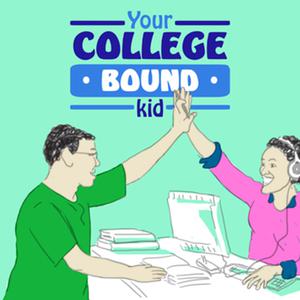 Your College Bound Kid | Admission Tips, Admission Trends & Admission Interviews
Your College Bound Kid | Admission Tips, Admission Trends & Admission Interviews
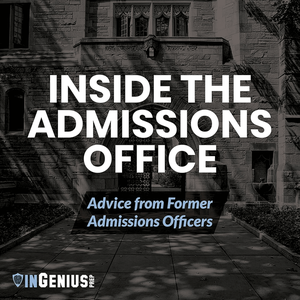 Inside the Admissions Office: Advice from Former Admissions Officers
Inside the Admissions Office: Advice from Former Admissions Officers
 Kelly Corrigan Wonders
Kelly Corrigan Wonders
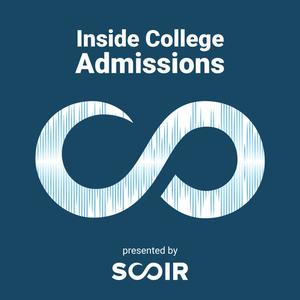 Inside College Admissions
Inside College Admissions
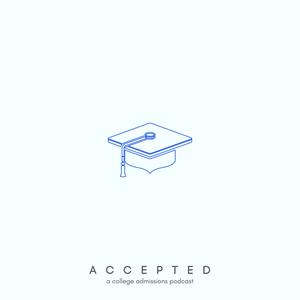 Accepted: A College Admissions Podcast
Accepted: A College Admissions Podcast
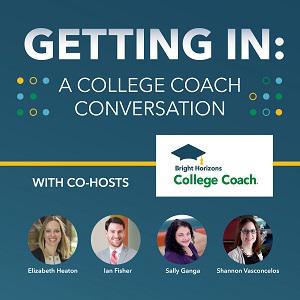 Getting In: A College Coach Conversation
Getting In: A College Coach Conversation